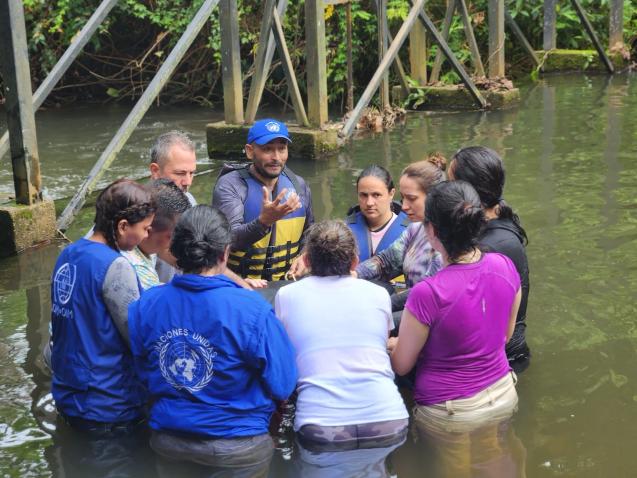29 June 2023
In an emergency, deaf personnel may not hear alarms, gunshots or explosions, vision impaired staff see flashing lights, and individuals with mobility impairments cannot use stairs when elevators are out of service. Being mindful of disability-related issues can enhance safety for all workers. UN Security in Colombia has gone one step further on integrating disability sensitivity by organizing a series of SSAFE training for UNSMS staff, including colleagues with physical and sensorial impairments from 19 to 21 June 2023, in the margins of the 16th session of the Conference of States Parties to the CRPD* (COSP16) which took place at the UNHQ from 13 to 15 June 2023.
“The participation of colleagues with disabilities adds to the dynamism because their approach to problem-solving is different. This enables us to evaluate fresh ideas and size up each issue from a different angle because they make up a significant amount of accessible information,” said Mr. Daniel Cerezo Gamarra, Deputy Chief Security Adviser – CSA/CSO a.i. in Colombia.
SSAFE, a training package of minimum standards is used as a Security Risk Management measure, in areas of higher risk, to mitigate and prevent emergency situations to which UN personnel are exposed in field missions. Over 24 participants from UNDP and UNHCR attended in hybrid mode in a wide range of scenarios, from UNSMS risk management, vehicles and movement, communications and technology, arrest and detention, local knowledge and sensitivity, handling of injuries in the field and riverine and maritime missions. The training helped to raise inclusivity awareness and to enrich knowledge on the needs of persons with disabilities and how colleagues can assist a disabled person in a dangerous situation. The practical exercises helped to build teamwork. “When mobility is an issue, assistance with transfers from one location to another is required from the course partner. Role players worked collaboratively contributing to the staging of situations in which the participants find themselves in the middle of the crossfire and must put what they have learned into practice: how to care for the injured, practice in-situ first aid, or what to do if they arrive at a legal or illegal checkpoint, or are confronted with an abduction situation,” said Mr. Cerezo. Similarly, when using Global Positioning System (GPS) requires visual support, a partner is assigned to work and be the eyes of the team. The virtual module of the training included interactive resources such as subtitles, audio, and videos, allowing persons visually impaired to listen to text-based information as part of the development of an inclusive program.
“Participants with disabilities are also aware of the risks to which they are exposed at work and learn to identify the security measures that they must consider such as being able to identify the vehicle that transports them, their office’s evacuation protocols and the support they need,” said Mr. Cerezo. The creation and reinforcement of an inclusive environment, both physically and socially, through SSAFE and supporting strategies, will be taken into consideration in subsequent courses. The Training Unit in Colombia organizes from 2 to 4 SSAFE training courses monthly.
* Convention on the Rights of Persons with Disabilities (CRPD) Article 1

